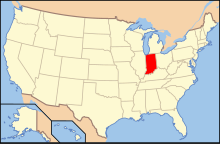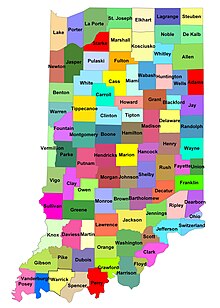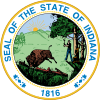 The flag of the State of Indiana
The flag of the State of Indiana The Seal of the State of Indiana
The Seal of the State of Indiana

The following outline is provided as an overview of and topical guide to the U.S. state of Indiana:
Indiana – a U.S. state, was admitted to the United States as the 19th state on December 11, 1816. It is located in the midwestern United States and Great Lakes Region of North America. With 6,483,802 residents, as of the 2010 U.S. Census, the state is ranked 15th in population and 16th in population density. Indiana is ranked 38th in land area and is the smallest state in the contiguous U.S. west of the Appalachian Mountains. Indiana's capital and largest city is Indianapolis, the second largest of any state capital and largest state capital east of the Mississippi River.
General reference

- Names
- Common name: Indiana
- Pronunciation: /ɪndiˈænə/
- Official name: State of Indiana
- Abbreviations and name codes
- Nicknames
- Crossroads of America (previously used on license plates)
- Hoosier State
- Hospitality State
- Common name: Indiana
- Adjectivals
- Demonyms
- Hoosier
- Indianian (usage disparaged)
- Indianan (usage disparaged)
Geography of Indiana
- Indiana is: a U.S. state, a federal state of the United States of America
- Location
- Population of Indiana: 6,483,802 (2010 U.S. Census)
- Area of Indiana (land and water): 36,418 square miles (94,320 km)
- Atlas of Indiana
Places in Indiana
- Historic places in Indiana
- National Natural Landmarks in Indiana
- Hoosier National Forest
- National parks in Indiana
- State parks in Indiana
Environment of Indiana
- Climate of Indiana
- Protected areas in Indiana
- Superfund sites in Indiana
- Wildlife of Indiana
- Fauna of Indiana
- Flora of Indiana
- Ecoregions of Indiana
Natural geographic features of Indiana
Human-made geographical features of Indiana
Regions of Indiana

Administrative divisions of Indiana
- The 92 counties of the state of Indiana
- Municipalities in Indiana
- Townships in Indiana
- Census-designated places in Indiana
Demography of Indiana
Government and politics of Indiana
Federal government in Indiana
- United States congressional delegations from Indiana
- United States courts in Indiana
Elections and political parties in Indiana
Branches of the government of Indiana
Executive branch of the government of Indiana
- Governor of Indiana
- State departments
Legislative branch of the government of Indiana
Judicial branch of the government of Indiana
- Indiana Judicial Nominating Commission
- Supreme Court of Indiana
- Indiana Court of Appeals
- Indiana Circuit Courts
- Indiana Court of Appeals
Law and order in Indiana
- Indiana Code
- Cannabis in Indiana
- Capital punishment in Indiana
- Constitution of Indiana
- Crime in Indiana
- Gun laws in Indiana
- Indiana Day
- Law enforcement in Indiana
- Same-sex marriage in Indiana
Military in Indiana
Local government in Indiana
History of Indiana
By period



- Indigenous peoples
- Evidence of human activity date as early 8000 BC.
- Hopewell culture developed agriculture and begins Indiana's first permanent settlements. 200 BC-400 AD
- Mississippian culture supersedes the Hopewells, who disappeared for unknown reasons, 900
- Mississippians build Angel Mounds, 1000.
- Beaver Wars begin between the Iroquois Confederacy and the Algonquian Confederacy depopulates much of Indiana. c. 1580 - 1701
- French fur traders enter Indiana and establish Tassinong, the first European outpost in Indiana, 1673
- Sieur de La Salle explores much of Indiana for the first time, claiming it for Louis XIV of France, 1679
- Algonquian tribes (including Miami, Wea, Shawnee, Pottawatomie) return to Indiana. 1680-1700
- Indiana is part of the French colony of Louisiane, 1699–1763
- Vincennes is founded along the Buffalo Trace, 1732
- French and Indian War breaks out, British capture the French outposts in Indiana, 1760–1761
- Pontiac's Rebellion spreads to Indiana, 1763.
- The Treaty of Paris of 1763 grants Indiana to the United Kingdom
- Indiana becomes part of the British (Francophone) Province of Quebec, 1763–1783
- Indiana is part of protected native lands, and closed to settlement. 1769-1773
- Pontiac's Rebellion spreads to Indiana, 1763.
- American Revolutionary War, April 19, 1775 – September 3, 1783
- United States Declaration of Independence, July 4, 1776
- George Rogers Clark invades Indiana capturing key British holdings in the Illinois Campaign. 1778-1783
- Treaty of Paris, September 3, 1783
- Unorganized territory of the United States, 1783–1787
- Virginia gives Indiana to the United States Government, 1784.
- Northwest Indian War, 1785–1795
- Harmar campaign, 1790
- Northwest Territory, (1787–1800)–1803
- Treaty of Greenville signed, opening part of Indiana for settlement for the first time by Americans, 1795
- Territory of Indiana, 1800–1816
- Treaty of Fort Wayne is signed, opening up much of southern Indiana to settlement, 1809.
- Administration of the District of Louisiana, 1804–1805
- Slavery in Indiana becomes a major issue, 1805.
- Tecumseh's War, 1811–1812
- Indiana in the War of 1812, June 18, 1812 – March 23, 1815
- Tecumseh's War merges with the War of 1812
- Siege of Fort Harrison, September 1812
- Siege of Fort Wayne, September 1812
- Battle of Wild Cat Creek, November 1812
- Battle of the Mississinewa, December 1812
- Treaty of Ghent, December 24, 1814
- State of Indiana becomes 19th state admitted to the United States of America on December 11, 1816
- Treaty of St. Mary's is signed, opening most of central Indiana for settlement, 1819
- Bank of Indiana created, 1832
- Indiana verges on bankruptcy, almost all of the state's public works are liquidated by the creditors, 1841
- Most of the native tribes are removed from Indiana, 1838–1846.
- Treaty of the Wabash signed, opening most of northern Indiana to settlement, 1840
- William Henry Harrison becomes ninth President of the United States on March 4, 1841
- Mexican–American War, April 25, 1846 – February 2, 1848
- Indiana's population exceeds 1 million, 1850
- Indiana adopted a new constitution, 1851
- Abraham Lincoln becomes 16th President of the United States on March 4, 1861
- American Civil War, April 12, 1861 – May 13, 1865
- Indiana in the American Civil War
- Morgan's Raid, June 11 – July 26, 1863
- Battle of Corydon, July 9, 1863
- Morgan's Raid, June 11 – July 26, 1863
- Natural gas is discovered near Eaton, Indiana, 1876
- Indiana in the American Civil War
- Indiana Gas Boom begins, 1884
- Natural gas supplies run low, ended the boom, 1905
- Benjamin Harrison becomes 23rd President of the United States on March 4, 1889
- Vietnam War, September 26, 1959 – April 30, 1975
- Indiana adopts a series of constitutional amendments that alter the makeup of the government, 1970–1971
By region
- By city
By subject
- List of Indiana state legislatures
- History of slavery in Indiana
- History of sports in Indiana
More
Culture of Indiana
- Cuisine of Indiana
- Museums in Indiana
- Religion in Indiana
- Scouting in Indiana
- State symbols of Indiana
The arts in Indiana
Sports in Indiana
Economy and infrastructure of Indiana
- Communications in Indiana
- Energy in Indiana
- Health care in Indiana
- Transportation in Indiana
Education in Indiana
- Schools in Indiana
See also
- Topic overview:
- All pages with titles beginning with Indiana
- All pages with titles beginning with Hoosier
- All pages with titles beginning with Indianian
- All pages with titles containing Indiana
- All pages with titles containing Hoosier
- All pages with titles containing Indianian
References
- ^ "States ranked by population density". Worldatlas.com. 21 June 2023.
- "Guide to State and Local Census Geography–Indiana, 2010 U.S. Census". U.S. Census Bureau. Retrieved 2012-08-09.
- "State & County QuickFacts Indiana". U.S. Census Bureau. Archived from the original on 2012-04-23. Retrieved 2012-08-09.
- "The Geography of Indiana". Netstate. Retrieved 2012-08-13.
- "Guide to State and Local Census Geography – Indiana". U.S. Census Bureau. 2011-12-22. Retrieved 2012-08-13.
- The official sobriquet of the State of Indiana has given rise to the humorous constructions Hoosierana (the land of Hoosiers; see uses in Indiana Journalism Hall of Fame Archived 2005-09-12 at the Wayback Machine and by sports journalist Frank DeFord) and Hoosierstan (the place of Hoosiers).
- "U.S. Census Bureau State & County QuickFacts Indiana". Archived from the original on 2012-04-23.
- "Profile of the People and Land of the United States". National Atlas of the United States. Archived from the original on 2012-09-15. Retrieved 2012-08-17.
External links
| Misplaced Pages outlines | |
|---|---|


